Makati City, Philippines – In a groundbreaking collaboration, Fashion Revolution Philippines, iAcademy, and Lee Jeans Philippines have come together to create a unique and sustainable fashion collection. The project, dubbed “Segunda Mana,” showcases the power of upcycling and the ingenuity of Filipino design students.
A Second Life for Denim
Lee Jeans Philippines donated a trove of old denim stock to iAcademy, challenging the students to transform the materials into a modern streetwear collection. Under the guidance of fashion designer and teacher Irene Grace Subang, the students delved into the art of deconstruction and draping, using Filipino mysticism and superstitions as their inspiration.
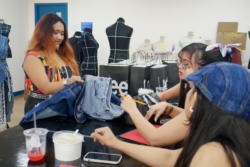
The “Segunda Mana” collection is a testament to the creativity and resourcefulness of the iAcademy students. By working exclusively with upcycled denim, they not only reduced their environmental impact but also created pieces with a unique story to tell. The collection’s intricate designs and thoughtful use of materials showcase the potential of sustainable fashion.
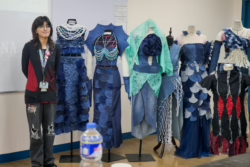
Showcasing Filipino Talent
A portion of the “Segunda Mana” collection was featured during iAcademy’s SODA Week, providing a platform for the students to showcase their work to a wider audience. The event culminated in a fashion show featuring designs from both current and former iAcademy students, highlighting the school’s commitment to nurturing young talent.
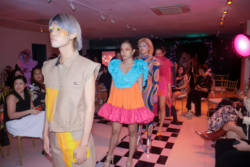
The collaboration between Fashion Revolution Philippines, iAcademy, and Lee Jeans Philippines is a significant step towards promoting sustainable fashion in the Philippines. By demonstrating the possibilities of upcycling and the creativity of Filipino designers, the project has the potential to inspire others to adopt more environmentally conscious practices.
El modelo de producción y consumo de la industria de la moda es responsable de que más de 900 mil toneladas de textil acaben en la basura cada año en España. Solo un 10% de este residuo llega a recuperarse, el resto se incinera provocando la emisión de gases contaminantes. Esto es consecuencia de la fast fashion, que ha provocado que al año se fabriquen 150.000 millones de prendas en todo el mundo y que compremos un 80% más de ropa que hace una década.
No hay mejor forma de gestionar el residuo que la prevención, en esta línea la frase de la fundadora de Fashion Revolution, Orsola de Castro, “La prenda más sostenible es la que ya tienes en el armario” refleja que la primera erre es la clave: reducir. Pero también otras erres son fundamentales, como Repensar (replantearnos a qué responden nuestras compras) y Reparar, el cuidado de nuestras prendas y sus arreglos son actos verdaderamente sostenibles.
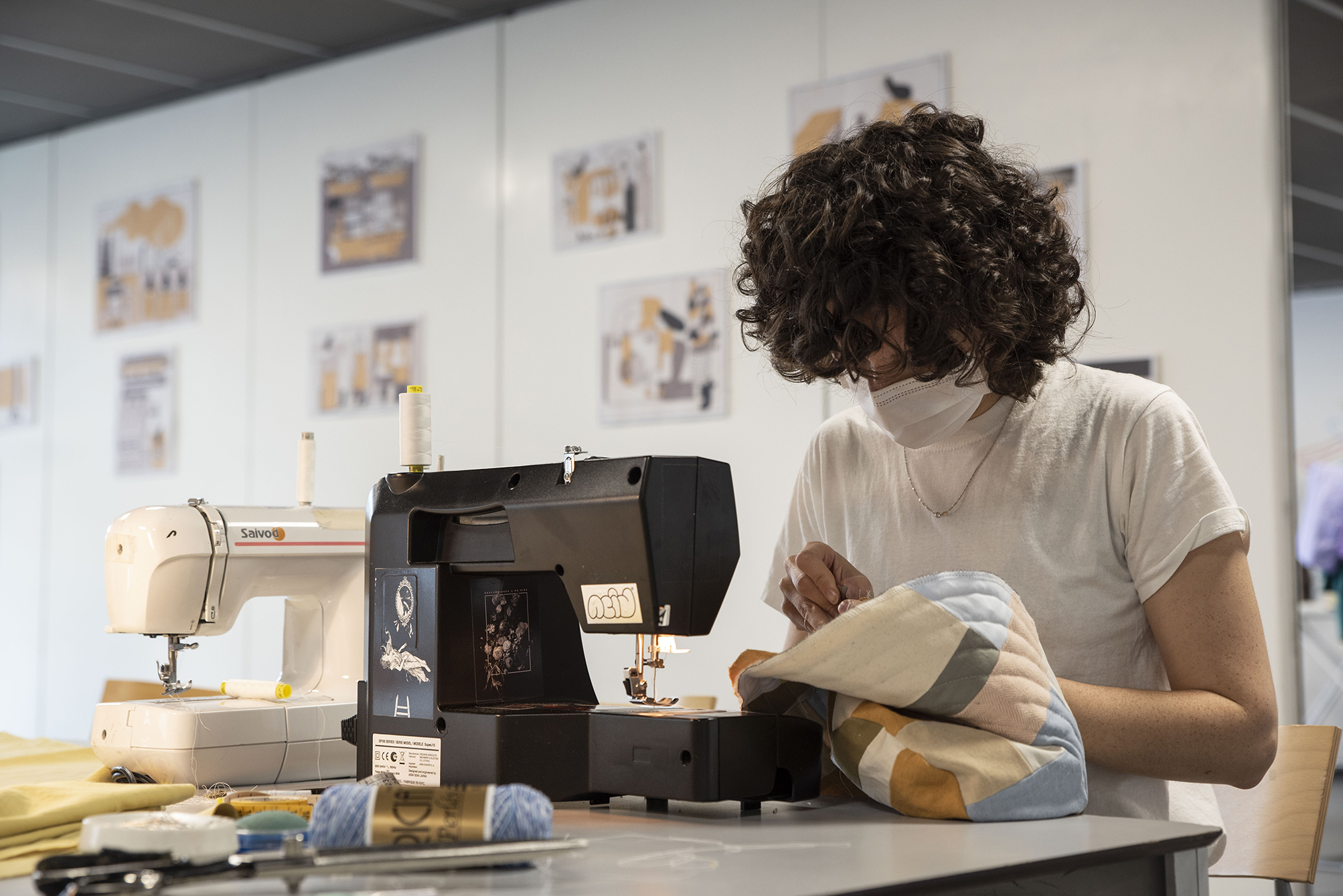
Foto Altrapo Lab
La V edición del Maratón de reciclaje textil organizado por Altrapo Lab y La Casa Encendida, transformado a un formato virtual, ha tenido como objetivo impulsar la moda circular y acercarla al público de manera accesible y reivindicativa. Los días 13, 14 y 15 de noviembre de 2020 a través de los canales y redes sociales de las dos organizaciones quedó claro el mensaje: una moda con impacto positivo es posible y la prevención y sensibilización son fundamentales para conseguirlo.
Después de cuatro ediciones presenciales del Maratón generando en La Casa Encendida un espacio de encuentro con una atmósfera muy particular y plástica, esta edición online se presentaba como un reto. Pero también como una oportunidad de ganar alcance y profundidad en las propuestas con un programa que invitaba a la participación y a la reflexión.
En el centro de la programación, al igual que otros años, se ha desarrollado el espacio de creadoras. Una convocatoria dirigida a diseñadoras y estudiantes de moda que propone crear una prenda a partir de ropa en desuso en directo durante el evento. Este año, su proceso creativo se pudo seguir a través de entrevistas en Instagram live con los cinco proyectos seleccionados. Además de mostrar su proceso de creación, nos dieron a conocer las razones por las cuales trabajan en esta vertiente del diseño basado en la reutilización y los objetivos que hay detrás de sus prendas. Los cinco proyectos participantes fueron:
Lara Padilla, creadora multidisciplinar con una propuesta, La Sra.D, presenta un proyecto de moda Art Fashion que nace del proceso artesanal que comprende el diseño de la prenda, la confección y su acabado final a través de la pintura a mano.
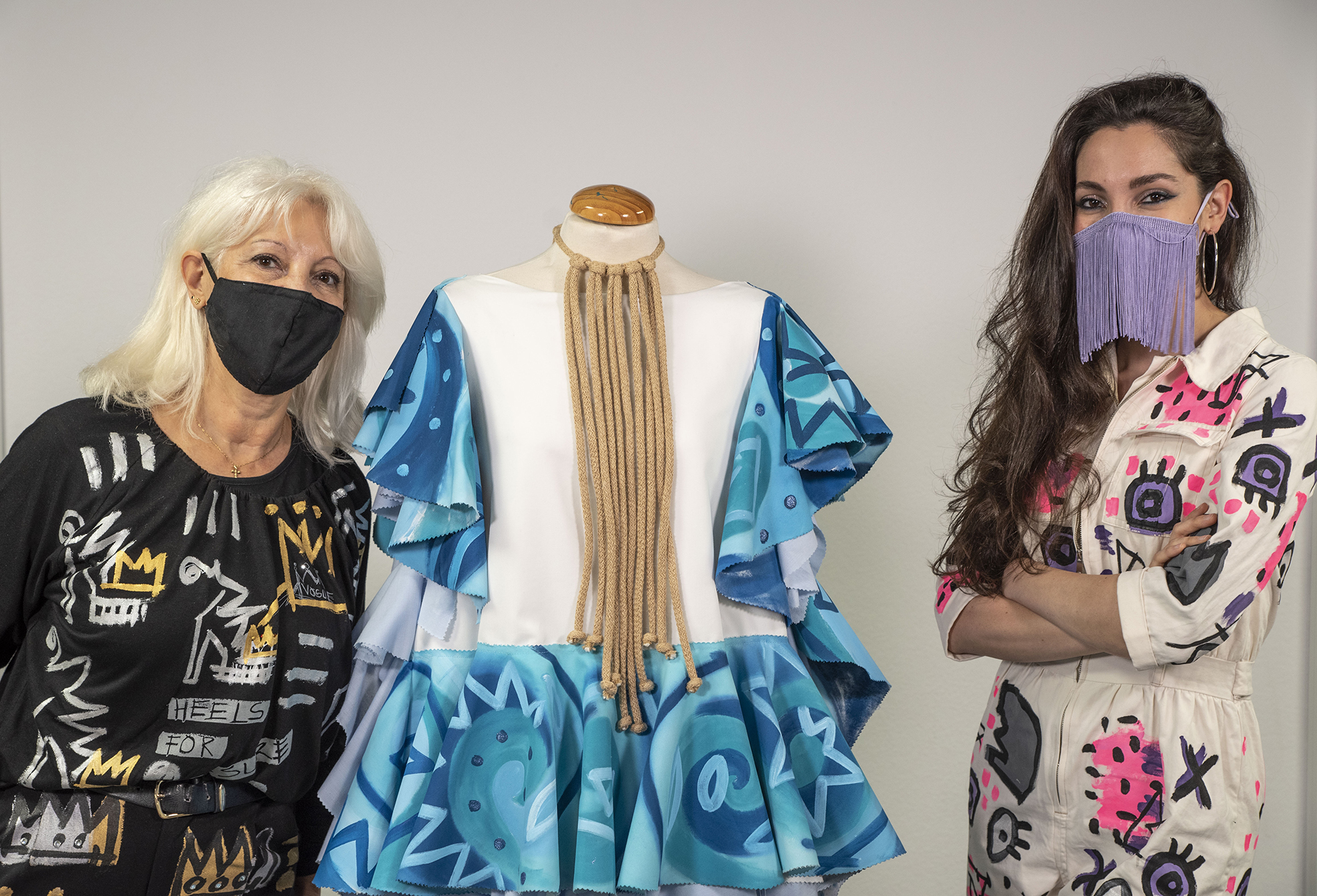
Foto Altrapo Lab
Ayaloik, Sara Ayala y Andrea Loik, con un proyecto que pone en común el diseño zero-waste con las técnicas tradicionales japonesas de sashiko y boro, que se empleaban para parchear las prendas de algodón (boro) e unirlas con pequeñas puntadas.
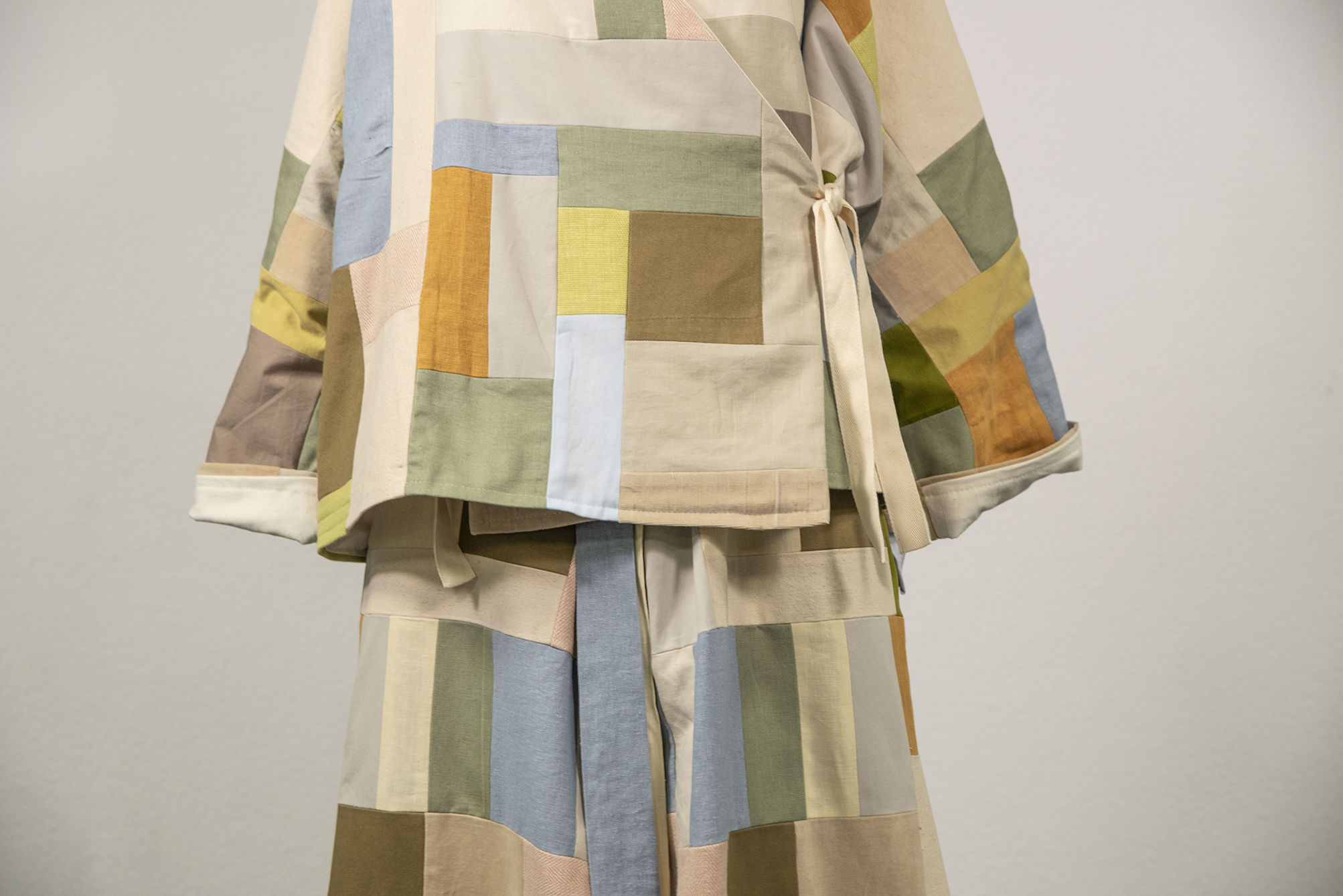
Foto Altrapo Lab
Olmedam, Miguel Peñaranda, artista visual y diseñador de vestuario, con su proyecto Crítica de lo invisible – Los ojos que ya ven– se inspira en los plumíferos que tan de moda están desde hace unos años, utilizando ropa de desecho triturada para rellenar dicha prenda.
Ana Almenara, diseñadora de moda que finalizó su proyecto fin de carrera en la London College of Fashion con un estudio sobre la customización de ropa titulado “la customización como búsqueda de identidad del sujeto”.
Homesickness, Manuel Sánchez, Ana M.García, Magdalena Rodriguez y Daniel Mirás, estudiantes de gestión industrial de moda en la Universidad de la Coruña. Con su proyecto buscan generar un impacto positivo a través del diseño de un chubasquero confeccionado con tienda de campaña y con un compartimento trasero para recoger residuos encontrados en cualquier espacio natural.
El viernes 13 se inauguraba esta quinta edición con una entrevista a Orsola de Castro, diseñadora pionera en upcycling, líder de opinión en moda sostenible y co-fundadora de Fashion Revolution, una organización global con participación en más de 100 países alrededor del mundo que lucha por conseguir una moda transparente y sostenible. (250 visualizaciones)
Después de 4 años de evento nos parecía fundamental hablar sobre Cómo nuestra ropa se convierte en residuo a través de una mesa redonda con personas expertas. Analizando tres aspectos; cómo se ha acelerado la industria y nuestro consumo de moda en los últimos años, cómo se gestiona el residuo textil post-consumo y cómo podemos prevenir y reducir los efectos de la fast fashion. Para ello, el sábado por la tarde charlamos con Brenda Chávez, periodista e investigadora especializada en consumo, Cristina Salvador, fundadora y responsable de Recumadrid, entidad dedicada a la recogida de textil y Jessica Checa, miembro de Fashion Revolution Spain. (300 visualizaciones)
Durante el evento se realizaron dos talleres online de upcycling. Uno dedicado a confeccionar un bolso a partir de patrones y con tejidos en desuso. Y otro que planteaba tres enfoques diferentes de diseño de camisetas a través de tres técnicas de upcycling. Dentro de estas actividades que invitaban a la participación, también se realizó un Unescape Room, un juego de lógica con el reto de decodificar el sistema de la moda. Más de 400 personas siguieron estas actividades desde sus casas.
El domingo se cerraba esta edición del Maratón con los cinco proyectos protagonistas presentando sus prendas finales. Una oportunidad de expresar la importancia de las alternativas en diseño de moda, donde la reutilización otorga mayor valor a la prenda y transmite un mensaje de concienciación y sostenibilidad. Habiendo alcanzado en los directos realizados unas 12400 visualizaciones, se finalizó así esta edición con la sensación de haber cumplido las expectativas de una formato completamente nuevo. La creatividad, la experimentación y la participación han sido los principales motores de este encuentro que ha sido posible gracias a un firme compromiso con las iniciativas que impulsan la moda circular y el consumo transformador de ropa.

From the very beginning, our artisans have always been our partners in positive change and empowerment! The journey of R2R, after all, really started with them. It was through their amazing talent of weaving and this artistry’s capacity to transform lives for the better that R2R became what it is today.

We’re pretty sure you’ve met some of our artisans in our Weaving with the Weavers events or even in our stores –– yes, some of our store ambassadors are artisans, too! But we have a wonderful (but very elusive!) group of artisans we’d love to introduce to you. You don’t get to see them often because these are our workshop artisans! They’re the ones running our humble workshop, assembling your bags to perfection before they land in our stores.
In honor of Fashion Revolution Week, we’re going to take you through our workshop and introduce to you the faces behind our production process!
1. NHING ESTABILLO, WORKSHOP SUPERVISOR

Ate Nhing started as an urban artisan from our Payatas community back in 2008 and since 2012, she’s been in charge of our workshop’s overall production, monitoring targets and making sure her team of amazing artisans create high quality bags and home items for you, our dearest advocates.
Update: Ate Nhing is now our Sales Ambassador! You can meet her in our Trinoma or UP Town Center stores!
2. BERNABE “BING” LOR, TEAM LEADER OF CUTTING

Kuya Bing, as we call him, is the lead of our workshop’s cutting team. Cutting is the very first step in our workshop’s production process! He and his team lays out the foundation of the bags by cutting and preparing the raw materials needed to make R2R bags. Once they’re done, the materials then get passed onto the other steps of our production process!
3. RUFINO “JUN” GAYANILO, JR., TEAM LEADER OF ASSEMBLY
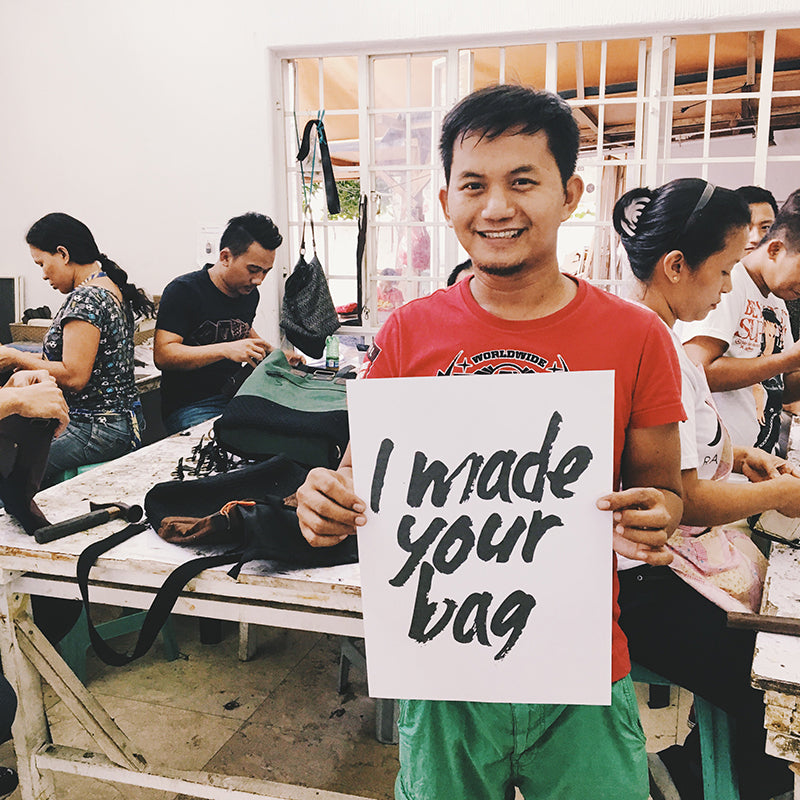
Kuya Jun leads our workshop assembly. Once all the raw materials –– from the handwoven fabric to the bags’ hardware –– have been prepared, he and his team take all these different parts and put them together to build the R2R bags that you own and use today.
4. JIMBO ZIPAGAN, TEAM LEADER OF SEWING

Kuya Jimbo is our workshop’s sewing team leader! He’s in charge of the major and minor sewing of all our bags and home items. Even with that big of a responsibility, he’s one of the people in the workshop who’s always wearing such a huge and happy smile! It’s SUPER contagious, we swear!
5. FLORENCIA “FENCIA” FONTE, TEAM LEADER OF QUALITY CHECKING

Ate Fencia leads the workshop’s quality checking team or QC, as we call it! They’re the ones making sure that each and every bag is up to par with our standards of excellence. We don’t just QC the pieces after it’s done; we also check per stage so we see if each part of the bags were prepared properly, from the handwoven fabric to the cut leather. It’s a very important step of our production process because we always want to deliver high quality pieces to you, our advocates.

In R2R, we believe that fashion can be made in a safe, clean, and beautiful way and where creativity, quality, environment, and people are valued equally. That’s why we think it’s super important to ask the questions: #whomademyclothes, #whomademybags? Join the Fashion Revolution!
Header photo: Carry Somers, co-founder of Fashion Revolution, visits the Rags2Riches workshop in October 2016.
Meet Margaret Kadi, creative inspirer at WORN
Recently we embarked on a journey behind the seams and met some of the local artisans working on the WORN initiative, a social venture that invests in communities worldwide to bring empowerment and education to children and young adults. Using precious recycled textile collected through various channels in Europe, the Artisans upcycle the materials into new and unique products. We catch up with Margaret Kadi, Founder of Project Sierra Leone and Pangea and Creative Inspirer at WORN to find out about herself and her work at the social enterprise.
Margaret was born in Sierra Leone but moved to London in the early nineties as the civil war began to break out across the country. She jumped on the education ladder at University in London and later worked in broadcast media for 12 years. She expresses with great sadness that she never made back until 17 years later when she visited for a two-week holiday – She was completely blown away. There was a buzz in the air and opportunities everywhere even though it is one of the poorest countries in the world. The people on the other hand are the warmest of people you would ever come across, as they are so welcoming.
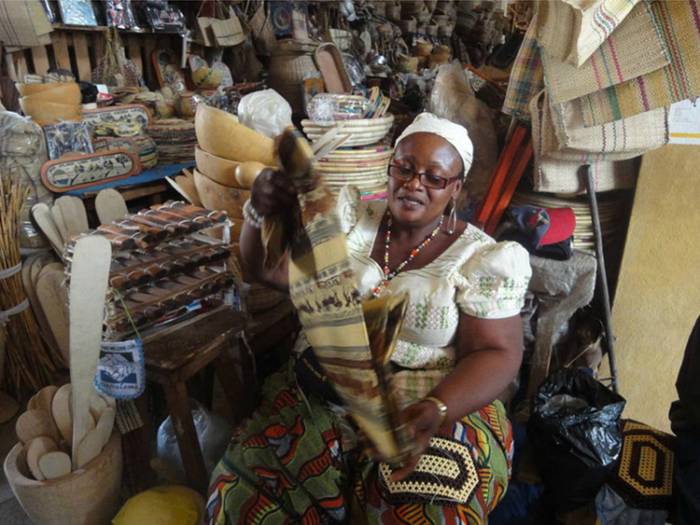
Her shop soon became the go to shop for gifts and fashion accessories and things were great for about a year until the Ebola hit the country heavily affecting local businesses and entrepreneurs. The cloth weavers are based in remote villages so it became a logistical nightmare to get the goods to Freetown when most areas were under quarantine.
“My biggest passion is continuing to create a sustainable business where empowering Sierra Leoneans is at the core of what they do. The original idea was to work with predominantly women but that quickly changed, as they wanted to have an inclusive and fair business where anyone can come in and train. Poverty is rife in Sierra Leone and it affects everyone so it only makes sense to train and work with as many people as possible. My one pre-requisite though is that they have a strong work ethic.
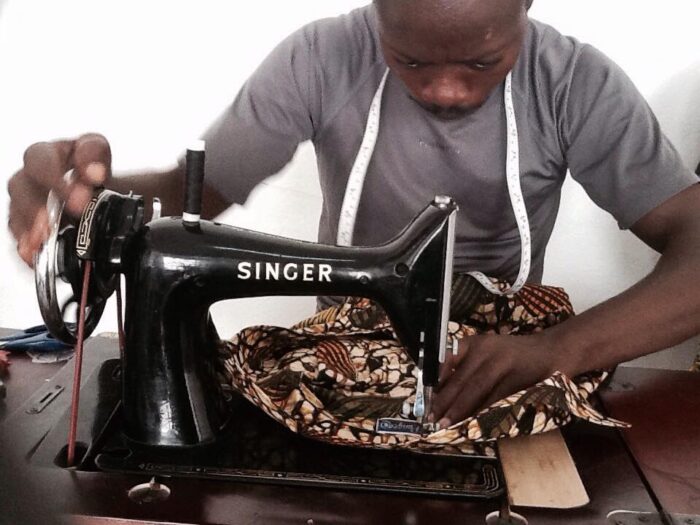
There are many moments of happiness in life but mainly when a client tells you that you surpassed their expectations, be it with a custom piece of furniture or a tailored dress. I also love it when customers find it difficult to believe that all our products are made in Sierra Leone. They admire the quality and standard so I hope we are changing the minds of some people who think locally made means poor quality…you could not be more wrong. I feel like our customers are our ambassadors because they give us really good feedback and ideas from things they see on their travels.
I have always been creative in that I have always had my own style. Trends have never been a big hit with me and I never like wearing what everyone is wearing so I always found ways to creatively customise my clothes and accessories. When I was at University I used to shop from charity shops and blend my finds with designer wear.
Sierra Leone like a few other countries is a really challenging place to be an entrepreneur. There is just so much to worry about. Having an idea is the easiest part but then you have to worry about where to get capital from to get things going. The interest rate on bank loans is extremely high so that deters a lot of great ideas coming to light. In my case, assembling a great team that understand your vision is terribly hard so you find yourself having to micro manage everything as I am a stickler for extremely high standards.
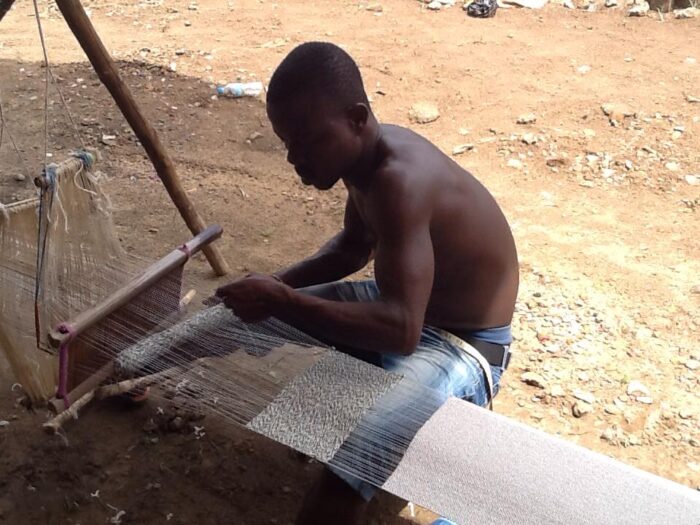
WORN is a wonderful initiative, especially as consumers are all about slow fashion and up cycling. I honestly think it could be the start of something big – I cannot wait to see if get off the ground. What we concentrate on is the transparent supply chain. This is absolutely imperative for any sustainable business and it gives the consumer added confidence that they are making the right decision to make a purchase. Secondly, I think it expands the mindset of the artisans who are not used to working within certain perimeters.
When asked on her advice to young entrepreneurs there was one thing she stuck by – Never give up. Believe in your ideas, if you do then its a lot easier to get others to see your vision. Get a mentor if you need to, perhaps someone doing something similar so they can guide you every step of the way until you are ready to unleash your idea to the world!
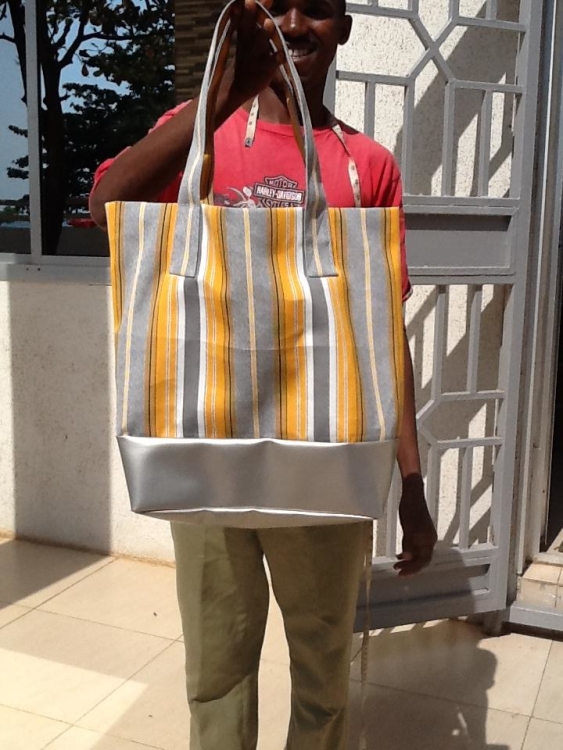
The Ebola outbreak in Sierra Leone affected every industry and the country as a whole as you can imagine. We are slowly getting back on our feet so things are not too bad. Our hope is to increase our collective of artisans by bringing in more, especially women that were affected by Ebola. We’ll train them in jewelry making, batik making and business skills so hopefully they can set up their own respective businesses.
There is a good crop of creative of artisans in Sierra Leone. Once you find one, they will lead you to the rest. I am so grateful for the group we have, as they are the best at what they do. The arts and culture scene is not big here so you would never get to hear about them otherwise. For us it is imperative for you to know the hands that touch and make our products. When you come into our store you will see beautiful products, two tailors working away on orders or one of our jewelry makers making a piece of jewelry. There is a greater appreciation for the products when you get to see and know the person responsible for the products you own so dearly.
We have big plans for the future. We’d like to open a training school/center where we can encourage people to come in and learn a trade – whether it is furniture making, jewelry making or tailoring. I think something like that is so desperately needed in Sierra Leone as there is a huge unemployment problem that we hope we can play our part in addressing this issue.
We have a few collaborations with some great brands so we look forward to sharing this with you in due course.
By Luke Meredith, Founder & Chief Inspirer, WORN

